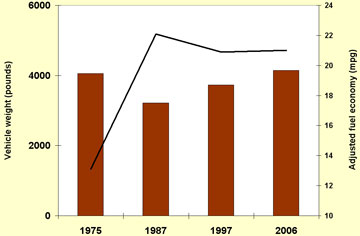American cars heavier, less fuel efficient in 2006 than 1986 finds EPA
American cars heavier, less fuel efficient in 2006 than 1986 finds EPA
$3 gasoline has no impact on American car sales finds EPA
mongabay.com
July 18, 2006
EPA takes a noteworthy stance on both climate change and energy security linking both to fuel efficiency
Despite record nominal gas prices, American automakers continue to make cars that are less fuel efficient than 20 years ago according to a new report from the Environmental Protection Agency (EPA). American consumers continue to purchase gas-guzzling sport utility vehicles and other light trucks at a steady rate.
While EPA’s “Light-Duty Automotive Technology and Fuel Economy Trends: 1975 Through 2006” did report that sales of light trucks has leveled off at about 50 percent of car sales after two decades of steady growth, the EPA found that “model year 2006 cars and light trucks are the fastest and heaviest since 1975” and, at 21.0 miles-per-gallon, are about 5 percent less fuel efficient than the fleet-average fuel economy peak value of 22.1 mpg achieved in 1987-1988
In the report, the EPA also links fuel economy to both climate change and energy security.
 Fuel efficiency and car weight, 1975-2006. |
“Fuel economy is directly related to energy security because light-duty vehicles account for approximately 40 percent of all U.S. oil consumption, and much of this oil is imported,” notes the report. “Fuel economy is directly related to emissions of greenhouse gases such as carbon dioxide. Light-duty vehicles contribute about 20 percent of all U.S. carbon dioxide emissions.”
The report says that Honda and Toyota (in that order) make the most fuel efficient cars sold in the United States while GM, Ford, and DaimlerChrysler manufacture and market the least fuel efficient cars and trucks.
Going forward, the EPA is optimistic about fuel efficiency noting that “recent technology developments, such as hybrid-electric vehicles, clean diesel technology, improved transmission designs, and engines equipped with variable valve timing and cylinder deactivation, hold promise for stable or improving fuel economy in the future.”
High oil prices fuel bioenergy push
High oil prices and growing concerns over climate change are driving investment and innovation in the biofuels sector as countries and industry increasingly look towards renewable bioenergy to replace fossil fuels. Bill Gates, the world’s richest man, has recently invested $84 million in an American ethanol company, while global energy gluttons ranging from the United States to China are setting long-term targets for the switch to such fuels potentially offering a secure domestic source of renewable energy and fewer environmental headaches.
Ethanol more energy-efficient than oil, finds study
Using ethanol — alcohol produced from corn or other plants — instead of gasoline is more energy-efficient than oil say researchers at the University of California, Berkeley. In a study published in Friday’s issue of the journal Science, Berkeley scientists show that producing ethanol from corn uses much less petroleum than producing gasoline, though they concede that there is still great uncertainty about greenhouse gas emissions and other environmental effects like soil erosion. Nevertheless the research suggests that at minimum, ethanol is a good substitute for gasoline and thus can help lessen the country’s reliance on imported oil. The study undermines critics who say that the push for ethanol is based solely on intense lobbying by the farm industry.